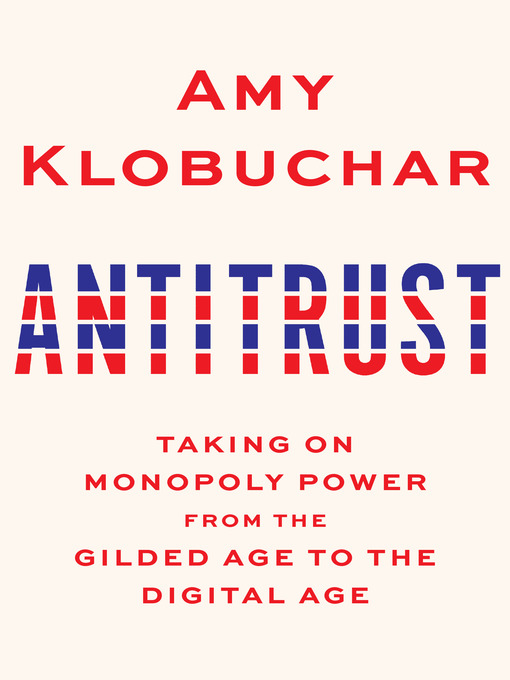
Antitrust
Taking on Monopoly Power from the Gilded Age to the Digital Age
کتاب های مرتبط
- اطلاعات
- نقد و بررسی
- دیدگاه کاربران
نقد و بررسی

March 15, 2021
The senior senator from Minnesota offers a thorough history of trustbusting in America and an urgent plea for stricter enforcement. Klobuchar is on a mission to strengthen and enforce federal antitrust laws in order to halt the growing consolidation of big business, which thwarts competition and exacerbates economic inequality. This book, unlike her standard-issue political memoir, The Senator Next Door (2015), is both a diligently researched history lesson and a well thought out plan, meticulously delineated, to take on "corporate consolidation, Congressional inertia, and the conservative courts." Showcasing her hardworking Midwestern roots, the author moves from her childhood in a Minneapolis suburb--her father wrote for the Star Tribune, and her paternal grandfather was a miner, a profession for which strong unions were crucial--to the initial growth of the Granger movement in response to grain price monopolies in the heartland. The first federal legislation was put forward by Ohio Sen. John Sherman in 1890, but it was not enforced until Theodore Roosevelt assumed the presidency and sought to dismantle the Northern Securities railroad monopoly, among many others. In 1911, Howard Taft broke up Standard Oil, thanks in large part to Ida Tarbell's groundbreaking expos�, which set the stage for the passage of more antitrust legislation--e.g., the Clayton Antitrust Act and Federal Trade Commission Act, both passed in 1914. Yet the progressive era gave way to war-caused fatigue and the reopening of certain legal loopholes. In addition to sketching the beliefs of the Chicago versus Harvard schools of thought on monopolies, Klobuchar examines key cases in the digital age (AT&T, Microsoft), alarming mergers in high tech and health care industries, and suits brought against Google and Facebook. The author also clearly shows how the previous administration's pro-business stance led to significant reductions in important resources like antitrust lawyers. The final section, "The Path Forward," is a staggeringly detailed, impressively documented and presented "list of the Top 25 recommendations to improve competition in our nation." Solid, sharp, articulate work--not just advertising for a possible 2024 presidential run.
COPYRIGHT(2021) Kirkus Reviews, ALL RIGHTS RESERVED.

March 15, 2021
This is a plea from Minnesota Congresswoman and recent presidential candidate Klobuchar for an overhaul to our national financial system, specifically antitrust legislation. Her concern is fueled by the anger and frustration she's experienced during the past decade presiding over the Senate Antitrust Subcommittee. Klobuchar reviews past monopolies, starting with a certain tea party, and continuing through the Gilded Age and the Sherman Act to current day, providing plenty of social, political, and legislative context. She highlights the loopholes, unintended consequences, and fallacies of previous laws, citing multiple court cases, with defendants ranging from chain stores to professional sports organizations to internet providers. Unsurprisingly, Klobuchar is very critical of Donald Trump's pre-White House business dealings and his uneven enforcement of antitrust policy during his term in office. Her message is simple: Big is bad. Bad for American workers, bad for social justice, bad for equitable access to information, goods, technology, and services--and really bad for political campaign donations. She argues for swift, sweeping reform in economic, legislative, social welfare, and human rights policies. A steady stream of period political cartoons help keep things lively, and her style is engaging and energetic. Expect significant interest.
COPYRIGHT(2021) Booklist, ALL RIGHTS RESERVED.

March 26, 2021
Senator Klobuchar's take on the state of antitrust law today manages to be surprisingly engaging and accessible, despite its dense, complicated topic. She presents the human impact of antitrust issues, weaving in stories of miners unionizing in the Midwest and the early years of the American railroad industry. While journalists often speak about the need for tax reform to address income inequality, Klobuchar deftly argues that tackling America's anticompetitive business atmosphere is just as important to improving citizens' lives. The second half of the book lays out a sensible road map with concrete policy strategies and priorities, representing the kind of pragmatic action the senator is known for. Occasional images and charts help to clarify details of antitrust legislation. VERDICT Even readers with only minimal knowledge of American business or the economy will be able to follow Klobuchar's analysis of anticompetitive business practices, and they may be surprised by how engaging the topic can be. A must for every public and academic library.--Sarah Schroeder, Univ. of Washington Bothell
Copyright 2021 Library Journal, LLC Used with permission.

























دیدگاه کاربران